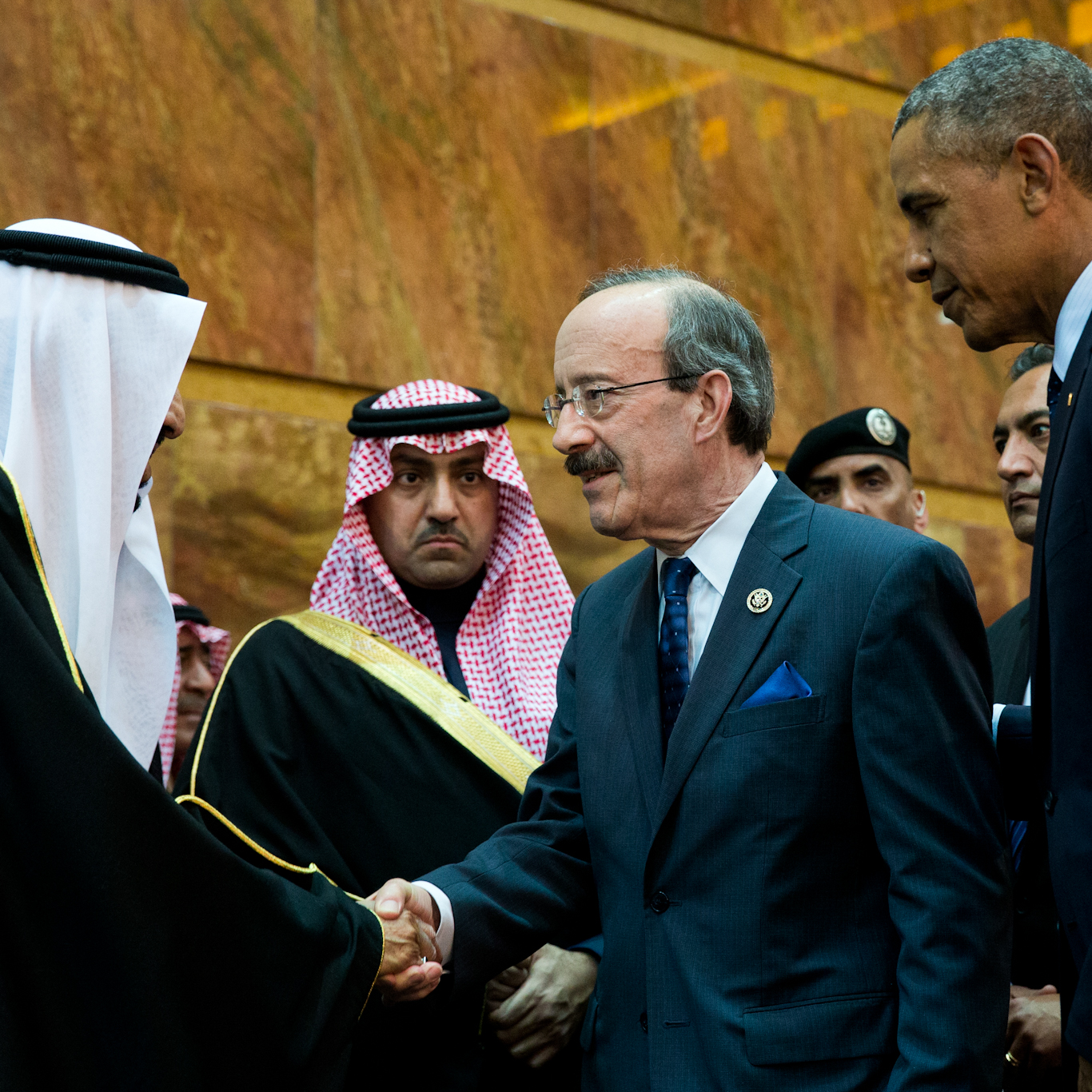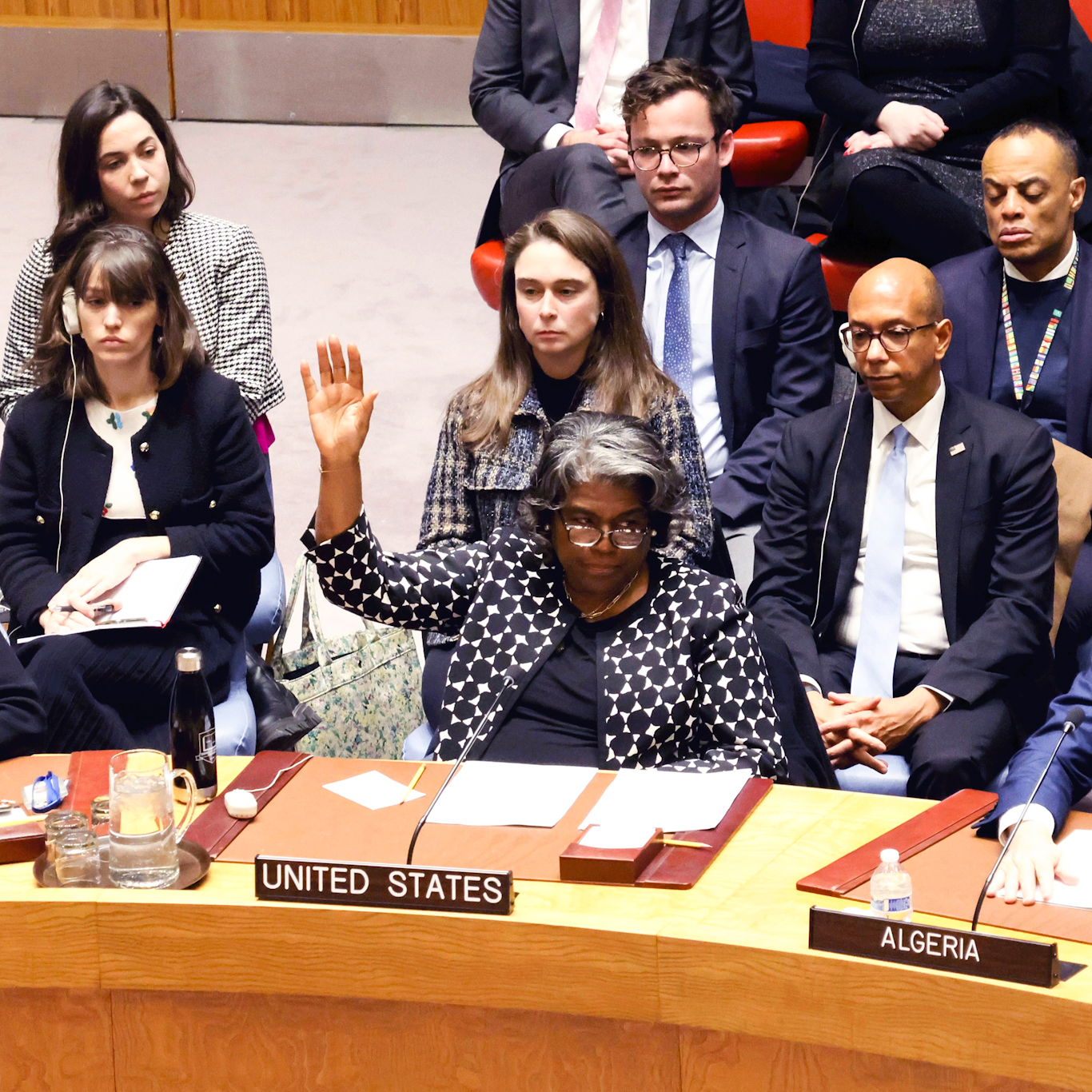DECONSTRUCTING H.R. 3202: THE ISRAEL LOBBY’S PERSISTENT ROLE IN SANCTIONING SYRIA

On February 13, the U.S. House of Representatives deliberated on Resolution 3202, the “Assad Regime Anti-Normalization Act of 2023.” The following day, the House passed the bill with a 389 to 32 bipartisan majority. Now, the bill moves on to the Senate, where it will most likely pass with similar bipartisan support and a ringing endorsement from President Biden once it reaches his desk.
The bill was pushed with a veneer of Syrian support represented by the advocacy of the Syrian Emergency Task Force (SETF) and the Syrian American Council (SAC) – Syrian opposition groups in the U.S. While its aims seem, at face value, to focus on humanitarian issues and a quest for accountability, the reality is much more complicated.
The Bill’s Stated Aims
The bill was presented to the public as a tool for accountability purely targeting the Assad-led government of Syria and any of its in-country partners. The bill purports to achieve this by “Prohibiting any U.S. official action to normalize relations with any Syrian government led by Bashar al-Assad, “Strengthening the human rights sanctions levied on Syria,” and” Examining the Assad government’s manipulation of the United Nations.”
In keeping with the polite presentation of the bill, Moaz Moustafa, SETF Executive Director, said: “We are proud to see legislation that holds the Assad regime and those normalizing with war criminals accountable” as a response to the passage of the bill.
Similarly, on the House floor, House Foreign Relations Committee chairman Mike McCaul announced that “Congress is sending a message that it remains committed to justice for the Syrian people.”
The Bill’s True Aims
While the stated aims seem to be focused on accountability and human rights, the real thrust of the bill was conveniently left unmentioned in the SETF and house representatives’ celebratory posts on X (formerly Twitter).
One line, deep within the 22-page bill, reads: “Section 7438 of the Caesar Syria Civilian Protection Act of 2019 is amended by striking ‘the date that is 5 years after the date of the enactment of this Act’ and inserting ‘December 31, 2032.'” This hidden line, left out of all the explainer content dished out by SETF and SAC, extends the Caesar Act, set to expire in 2024, for eight more years.
The perversely named Caesar Syria Civilian Protection Act of 2019 has immiserated the more than 12 million Syrian people living under the government of Syria. Since the enactment of the Act, the percentage of the Syrian population below the poverty line has reached 90%, 600,000 Syrian children’s growth was stunted, and cases of anemia in pregnant and breastfeeding women saw a 60% rise.
Described as “unprecedented,” as one of the “strictest and most complex collective regimes in recent history,” and as the “most complicated and far-reaching sanctions regimes ever imposed,” the Syrian groups pushing for Caesar’s eight-year extension understandably shied away from mentioning the most crucial part of this new bill, even though they helped provide Syrian cover for its passing.

As for normalization, although the bill purports to impose only a U.S. policy of wholesale rejection of normalization with the Syrian government, in reality, the bill lists several measures that would threaten a whole list of other countries wishing to restore diplomatic relations with Syria.
The bill calls on the Secretary of State to submit an annual report to Congress detailing a “strategy to describe and counter actions taken or planned by foreign governments to normalize, engage with, or upgrade political, diplomatic, or economic ties with the regime led by Bashar al-Assad in Syria.” This annual report must also include “a full list of diplomatic meetings at the Ambassador level or above, between the Syrian regime and any representative of the Governments” mentioned.
The report must also include a list of any transaction of $500,000 or more between any “foreign person located in Turkey, the United Arab Emirates, Egypt, Jordan, Iraq, Oman, Bahrain, Kuwait, the Kingdom of Saudi Arabia, Tunisia, Algeria, Morocco, Libya, or Lebanon” and any “recipient in any area of Syria held by the Assad regime.”
Sanctioning Syria: A Washington Tradition
H.R. 3202 is not the first, nor will it be the last, sanctions bill to target Syria. The economic war that the United States has been waging against Syria started long before a Tunisian banana salesman self-immolated, launching what would come to be known as the Arab Spring.
In 1973, as the October War was waging, Henry Kissinger was perfecting his shuttle diplomacy in hopes of breaking the thorn that was former Syrian President Hafez Al Assad. Kissinger tried everything in his arsenal to get the then-Syrian president to abandon the military struggle and resistance of alliances he was waging against the U.S. presence in the Middle East, particularly Israel.
Upon failing to sway Assad’s Syria from supporting Hezbollah, Palestinian Jihad, Hamas, and other resistance groups, and once Syria’s position was weakened by the Egyptian signing of the 1978 Camp David Accords, the ire of the U.S. State Department and Treasury, fell upon the Arab Republic.
Syria’s name was written atop the inaugural “State Sponsors of Terrorism” (SST) list in 1979, along with Iraq, Libya, and South Yemen. Today, Syria remains the only inaugural member still on the list, sharing the limelight with newly added countries: Cuba, Iran, and North Korea.

For the past 45 years since Syria made it on the SST list, the sanctions have never stopped. Below is a summarized list of all the sanctions that have been progressively levied upon the country of Syria and its people:
- In 1979, the Export Administration Act added Syria to the SST and thus restricted Syria from receiving foreign assistance funds from the United States. The Act added that the Secretary of State must notify Congress before licensing the export of goods or technology worth more than $7 million to Syria.
- In 1985, the threshold for notifying Congress before licensing the export of goods or technology to Syria was lowered from $7 million to $1 million.
- In 1986, the Omnibus Diplomatic Security and Antiterrorism Act of 1986 and Omnibus Budget Reconciliation Act of 1986 respectively banned U.S. military sales to Syria and denied foreign tax credits on income or war profits from Syria with both of these laws citing alleged Syrian government support for terrorism.
- In 1989, the threshold for notifying Congress before licensing the export of goods or technology to Syria was lowered from $1 million to any value.
- In 1994, an amendment to the Foreign Assistance Act of 1961 mandated that the United States withhold a proportionate share of funding and contributions to international organizations for programs that benefit Syria.
- In 1996, under the Antiterrorism and Effective Death Penalty Act of 1996, the U.S. President was required to withhold aid to third countries that provided assistance or lethal military equipment to Syria.
- In 2003, the Syria Accountability and Lebanese Sovereignty Restoration Act (SALSRA) imposed broad sanctions based on alleged WMDs accusations against Syria and Syria’s support of “Hezbollah, Hamas, the Popular Front for the Liberation of Palestine, and the Popular Front for the Liberation of Palestine-General Command.”
- In 2004, Bush announced an executive order expanding upon the SALSRA. The expansion cited Syria as being “an unusual and extraordinary threat to the national security, foreign policy, and economy of the United States” in its “undermining of […] stabilization and reconstruction of Iraq.“
- In 2008, three years before the Arab Spring, the Bush administration imposed further blocks on assets related to public corruption in Syria.
Once the uprisings of the Arab Spring reached Syria, the trickle of sanctions became a flood, and a bevy of bills and executive orders levied an array of sanctions on multitudes of industries in Syria, all culminating in the 2019 Caesar Civilian Protection Act.
Today, Syria is the most heavily sanctioned country per capita in the world. Falling third behind only Russia (after the Ukraine war) and Iran. Syria, however, is much smaller than the valedictorian and salutatorian of U.S. sanctions and orders of magnitude worse off economically, therefore desperately tethered to the international export-import economy for its survival and more vulnerable to the damage of sanctions.
Who’s Responsible for the Tradition of Sanctions?
Although H.R. 3202 is not the first bill sanctioning Syria, it shares a crucial element with all its predecessor bills that have targeted Syria for the past half-century: the Israel Lobby.
The 1979 bill that introduced Syria to the cruel reality of sanctions was a direct response to Syria’s role in the October War of liberation waged against Israel and for Syria’s unwavering support of the Palestinian resistance.
The SALSRA Act of 2003 and the Caesar Civilian Protection Act of 2019 – the second and first most robust sanctions bills imposed upon Syria, respectively – were both written by Eliot Engels, a former Democratic congressman from the Bronx.
Engels, a New York Democrat accused of tax fraud, is one of the top recipients of the American Israel Political Action Committee (AIPAC) money in Congress, with a total of $1,847,342 raised from the Zionist PAC.


As a member of the Arab-Israeli Peace Accord Monitoring Group, Congressional Hellenic-Israeli Alliance, and the Israel Allies Caucus, Engels is perhaps the foremost supporter of Israel amongst his Democrat peers.
One of the first bills he introduced was to recognize Jerusalem as the undivided capital of Israel. He also wrote a resolution condemning a United Nations Security Council Resolution that condemned illegal Israeli settlements in the West Bank and was one of the few Democrats who broke rank and voted with their Republican peers to kill a bill that would have banned the sale of U.S. made-cluster bombs to Saudi Arabia – cluster bombs that would later be dropped on Yemeni civilians by the monarchy.

Following in Engels’ footsteps, Joe Wilson, the author of H.R. 3202, also receives AIPAC money, albeit much less than the man whose work he extended by eight years.

Wilson, a South Carolina Republican who cut his teeth as a young aide working for civil rights opponent Strom Thurmond and later defended his legacy, has also been one of the most ardent supporters of Israel in Congress throughout his service.
Grateful for the opportunity to join my colleagues in a bicameral, bipartisan support of Israel. Thousands gathered on the National Mall to hear the collective sounds of solidarity in the ‘March for Israel. March to Free Hostages. March Against Antisemitism.’ #StandWithIsrael pic.twitter.com/IKjRr50qnK
— Joe Wilson (@RepJoeWilson) November 14, 2023
In an interview with AIPAC, Wilson, who also serves as the chair of the Middle East and North Africa subcommittee, Global Counter Terrorism Committee member, and House Committee on Foreign Affairs member, raised the alarm about threats posed by Iran and the Houthis towards Israel and the United States. He added that he is “grateful for the military service and what America has provided for the world.” So extensive is Wilson’s dedication to the cause of Israel that he once bragged that a Jewish person described him as “a real mensch,” Yiddish nomenclature meaning ‘a person of honor.’
Syrian Window Dressing
Even the facade of faux grassroots Syrian support that was put forth for H.R. 3202 has shady links to account for its advocacy of regime change and rampant sanctions.
The Syrian Emergency Task Force has been widely documented to have direct funding links to the U.S. State Department and extensive ties to the Washington Institute for Near East Policy (WINEP) and AIPAC. The group was condemned for its incessant push to get the Obama Administration to launch a Libya, or even Iraq-style invasion of Syria in order to force a regime change.

As journalist Max Blumenthal documented for Mondoweiss magazine, SETF has publicly celebrated a donation of $1 million from Cuba regime change organizations in a post on their website that has since been removed.
As for the neocon-aligned 501 (c) Syrian American Council (SAC), a more bloodthirsty front organization for regime change war could not be found. In 2018, as a response to the now debunked Douma chemical attacks, the SAC urged President Trump to “follow through on his tweets Sunday morning, and to take immediate action against this tyrannical regime…by grounding Assad’s air force.”
In 2017, the SAC publicly lamented Trump’s refusal to continue the Obama administration CIA funding program of Jihadist terrorists in Syria, claiming that the $1 billion a year program “was always too weak to tip the scales.”
Syrian Civilians: Not an American Priority
After the death toll of Palestinian children in Gaza reached a staggering 12,000, skepticism arises when observing the Permanent U.S. Ambassador to the UN, Linda Thomas, vetoing a fourth U.N. Security Resolution calling for a ceasefire in Gaza. It becomes evident that the U.S. establishment’s concern for the lives of the Syrian people, let alone non-Israelis in the Middle East, is dubious at best.

Likewise, anyone listening to U.S. special envoy for Syria, James Jeffrey, characterize the suffering of the Syrian people as part of a geostrategic policy to transform Syria into “a quagmire for the Russians,” akin to the U.S. experience in Vietnam can comprehend the true motivations behind H.R. 3202 and preceding bills imposed on Syria.
Lastly, observers noting the statements of Dana Stroul – Democratic co-chair of the bipartisan Syria Study Group (2018-2020), former deputy assistant secretary of defense for the Middle East (2021-2023), and current researcher at WINEP – discussing the “rubble” that the U.S. intends to keep Syria in and the “leverage” it plans to maintain over Syria, grasp that the policy of sanctioning Syria and obstructing reconstruction has long been endorsed by the bipartisan consensus in Washington. The driving force behind these detrimental policies has consistently been neoconservative regime change proponents and individuals affiliated with pro-Zionist think tanks.
Biden official Dana Stroul in 2019: via military occupation, US “owns” Syria’s “resource-rich” “economic powerhouse” region. And via sanctions, it can “preventing reconstruction aid and technical expertise from going back”, leaving Syria in “rubble.” pic.twitter.com/WmZSfvXrKR
— Aaron Maté (@aaronjmate) June 13, 2021
In an interview with Joshua Landis, one of the few Independent U.S. experts on Syria, Landis shared his opinion on the crass and transparent language used by the likes of Jeffrey and Stroul, telling MintPress,
They’re saying that even if we don’t succeed in getting rid of Assad.. At least we lock [Syria] into a stalemate… A stalemate that denies Iran and Russia a strategic Victory.”
In describing the U.S.’ long-term goals in Syria to MintPress, Landis evokes the Arabic word for swamp or mustanka’a. “The long-term goal of America is to deny Syria as a strategic asset that’s got some money, and that can help [Russia and Iran], and so keep it as poor as possible and make it mustanka’a,” Landis concluded.
Long Term Damage
The Anti-Assad Regime Normalization Bill is the latest in a series of measures that the U.S. has taken against the Syrian people for the crime of winning a regime-change war imposed upon them.
The U.S. hypocrisy on the global stage is now clearly evident to all who wish to see it. While the U.S. condemns and sanctions Venezuela for barring an opposition leader convicted of treason from running in the upcoming election, it supports and even provides IMF loans for Pakistan even after the latter ousted its democratically elected leader who chose neutrality in the Ukraine war.
The U.S. system of rules-based order that has prevailed since 1945 with the establishment of the Bretton Woods Institutions is slowly unraveling. The dollar’s strength is waning, and the bite of U.S. unilateral sanctions has become duller over the years, as evidenced by the failure of the Russian sanctions regime.
While the U.S. will undoubtedly succeed in causing another generation of Syrian kids’s growth to be stunted, and while it will succeed in bringing more Syrian families below the poverty line during the coming eight years of Caesar Sanctions, it is all the while wrecking any semblance of credibility it might still have on the global stage, and – most unfortunate as Joshua Landis surmised while sharing his thoughts on the new bill – losing its identity along the way.
Through much of American history, America believed that a stronger middle class made democracy and contributed stability in the world. But with this promiscuous use of sanctions, America is betraying its own values to lift people into the middle class. And now by trying to drive them into poverty, and using sanctions as a central instrument of its foreign policy, it’s creating deeper anger, and impoverished people who are less educated, and less capable of competing in the modern world. In theory, all this is to promote democracy or Justice … but of course it’s not going to do that. It’s just going to make people more desperate, more Islamist, and more available to radical ideologies.”
Feature photo | Illustration by MintPress News
Hekmat Aboukhater is a Syrian American investigative journalist reporting from France, the U.S., and Syria. Hekmat hosts the WhatTheHekmat Podcast and the Conversations With Dissidents show. He has written for The Grayzone and Al Mayadeen. Follow him on X @WhatTheHekmat.


